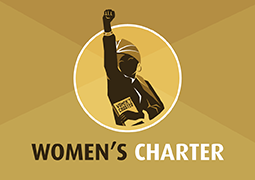
The Deputy Chairperson of the National Council of Provinces, Ms Sylvia Lucas, told the women of Sara Baartman District and Nelson Mandela Metropolitan Municipality in Gqebera recently that report-back sessions are a point of convergence between women and their government representatives on the points of interest relating to women that are contained in the 2021 Women’s Charter for Accelerated Development.
Ms Lucas reminded the women who filled New Brighton’s Mangoza Jebe Hall in Gqebera that Parliament reached out to all women in 2019 to solicit their views on the 1994 Women’s Charter, 25 years after it was adopted as a revised version of the 1954 Women’s Charter. The 1994 review led to the adoption of the 2021 Women’s Charter for Accelerated Development.
The Eastern Cape report-back session, which took place a few weeks after Women’s Month came to a close at the end of August, brought provincial, legislative and local councillors to communities of women to present to them the government’s responses to their issues and to establish the extent to which democracy works for them. Also present in the Gqebera session was the Commission for Gender Equality and the Finance and Fiscal Commission (FFC).
The Eastern Cape government’s MEC for Social Development, Ms Bukiwe Fanta, who represented the Eastern Cape Premier, reported on the steps the Eastern Cape government has taken to appoint women in key government leadership positions. She said women comprise 60 per cent of the Eastern Cape provincial cabinet, while seven provincial government departments have female heads. “We are fortunate in this province of the legends that there are well-educated and knowledgeable women whose appointments are fitting,” said Ms Fanta.
Also participating in the report-back session, the FFC’s Ms Nomonde Madubula said despite what has already been achieved, unacceptable gender inequalities remain. She suggested that gender-responsive budgeting is one of the essential tools to achieve gender equality. “This use of the budget to achieve gender equality or equity is called gender-responsive budgeting (GRB). It is about deliberately making the intergovernmental fiscal relation system responsive to the needs of women and contributing to moving women out of poverty,” she emphasised.
GRB is about gender-sensitive resource allocation, integrating a clear gender perspective within the overall context of the budget process and understanding the implications of fiscal decisions on gender, Ms Madubula said.
The FFC believes that budget prioritisation based on the needs of men and women ensures inclusivity and is an innovative strategy to achieve gender equality. Ms Madubula proposed that all budget documentation, including the Division of Revenue Bill, the Medium-Term Budget Policy Statement and departmental strategic and annual performance should include gender-responsive budgeting.
The report-back sessions offered women an opportunity to reflect on the reports presented to them by their government representatives. Some of the issues women highlighted in Queenstown in the Chris Hani District where the first leg of the Eastern Cape report-back session took place included drug abuse by the youth, incapacity of the police as well as gender-based-violence and femicide.
A common issue raised by women in all the provinces visited is the problem of unemployment. Once women reach 35 years of age, they are told by employers that they are too old for employment, while the government says they are too young to receive government pensions.
Mava Lukani
22 September 2022

